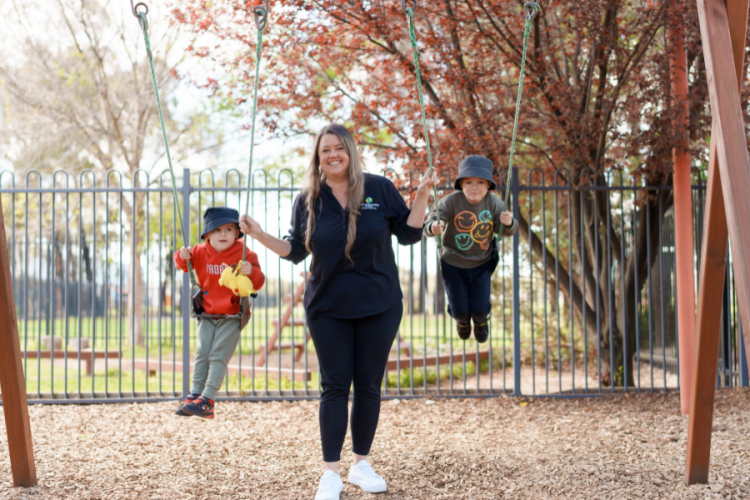From hands on learning in SA’s regions, to intergenerational partnerships at a kindergarten in the city, and the transformation of a preschool in Adelaide’s north – these are the people and places recognised in the 2025 Public Education Awards.
Lake Windemere Children’s Centre’s director has just been named South Australia’s top education leader, recognised for transforming her northern suburbs preschool into a model for connection, care and community.
Director Tarsha Howard is one of 12 winners recognised in the 2025 Public Education Awards.
She has been named the winner of Excellence in Leadership — but when she first found out she’d been nominated, she thought it was a mistake.
“I was like, sorry, what are you talking about? I didn’t know anything about it – those cheeky girls!” she laughs.
Her team at the Salisbury North centre had quietly pulled together the nomination themselves. “It was a big surprise, but really lovely,” she says. “It just shows what a special group of people I work with.”
“It’s lovely to be recognised, but really it’s about the team and the families. None of this happens without them.”
A place that grows with its families
For those who haven’t set foot inside one, a children’s centre is part preschool, part community hub. At Lake Windemere, that means everything from government preschool and occasional care to playgroups, parenting programs and connections to food and family support.
It’s the kind of place where staff have relationships with the children – and their parents – that span many years. “We’ve known some of our families since their babies were tiny. Then we see them again when they start school – it’s that sense of community that makes it special,” Tarsha says.
Children’s Centres like Lake Windemere are supported by the state government to bring together care, education, health and family services under one roof. But no two are exactly the same – each one is designed around the needs of its local community.
“Every community is different,” Tarsha says. “What we offer here might not be what another Children’s Centre offers, because it’s all about what families in that area need most.”
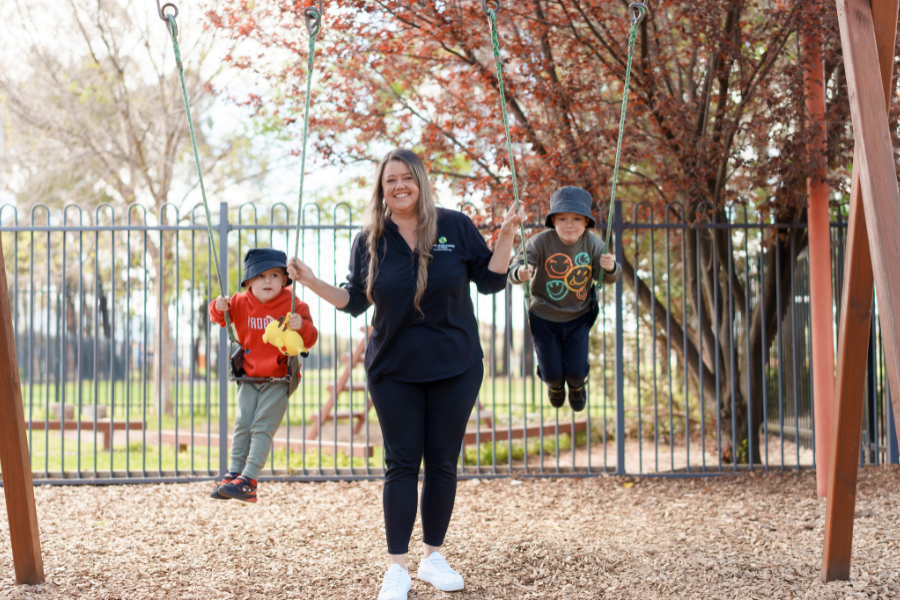
A centre shaped by its community
The centre sits within the grounds of Lake Windemere B–6 School, which is also a finalist in this year’s awards for Outstanding Reconciliation Initiatives. Together, they form a seamless birth-to-school community where families are supported at every stage.
Lake Windemere is located in Salisbury North, a community where many families face extra pressures and challenges. The centre supports a diverse mix of families, including local First Nations families, and Tarsha says understanding each family’s story is key.
“For us, it’s about being a place of welcome,” she says. “Every family that walks through our doors needs to know they belong here, and that we see their strengths.
“For me, it always comes back to belonging. When families feel safe and connected, that’s when children thrive – and that’s when learning really starts.”
From the APY Lands to Salisbury North
Tarsha’s approach was shaped far from Adelaide’s suburbs. Straight out of university, she headed north to the remote Anangu community of Amata, where she spent three years teaching on the APY Lands.
“Out there, everyone was part of the same story – the school, the families, the kids. It taught me that relationships are the foundation of learning,” she says.
That lesson has stayed with her. Today, she leads a diverse team – educators, speech pathologists, occupational therapists and community development workers – who wrap around children and families, making sure every child has the chance to thrive.
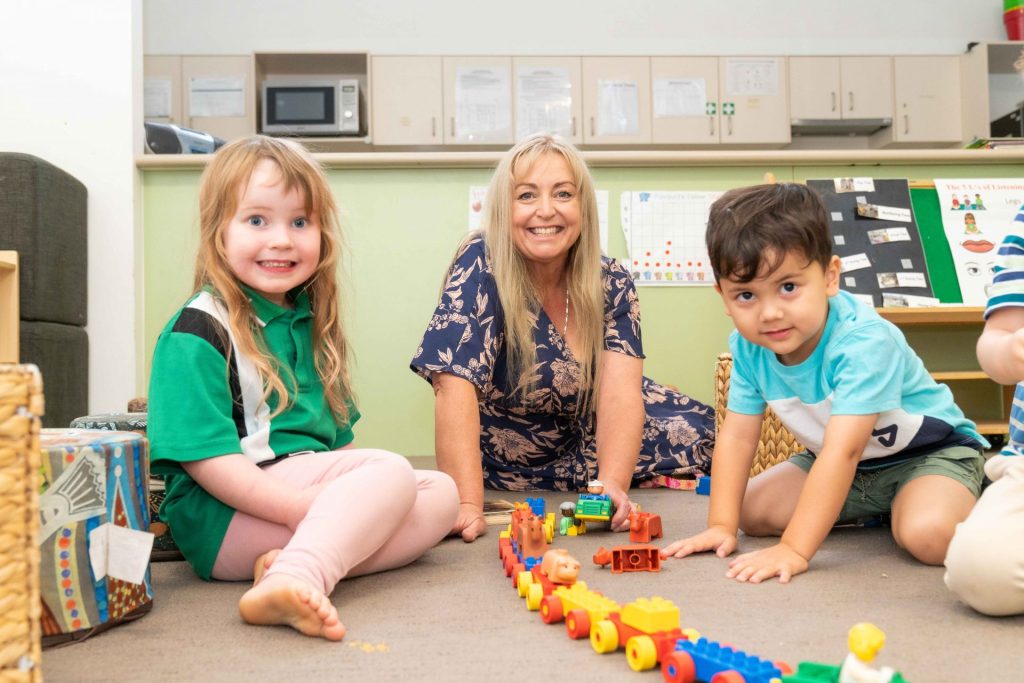
Leading through challenge and change
When Tarsha arrived at Lake Windemere, she had big plans for community engagement – then COVID hit.
“Within months of starting, we were shutting down all our programs and trying to support families from a distance,” she recalls. “It was really hard, especially because I’d come to a children’s centre wanting to build connections.”
Rebuilding those relationships became her focus once restrictions lifted. “After so much isolation, we had to bring everyone – staff, families, kids – back together again,” she says. “Our vision was to make Lake Windemere a place of welcome for everyone, where families felt safe coming back.”
Her leadership helped reconnect not only the team, but the wider community – laying the groundwork for what will soon become one of South Australia’s first government-operated Integrated Hubs.
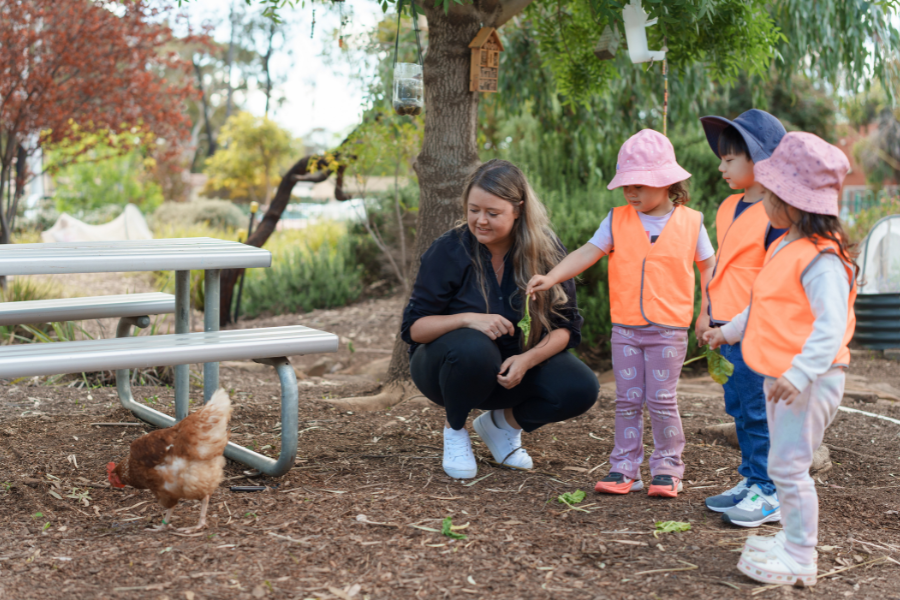
Learning in the garden (and with the chooks)
Walk through the gate today and you’ll find children digging in the Stephanie Alexander Kitchen Garden, a space shared with the primary school.
“Our preschoolers are learning how to grow, taste and engage with food – it’s hands-on, joyful, and connects families with the school community,” Tarsha says.
There’s also a new Zero-to-Four Playgroup in the garden, where families can meet the resident chooks and join in with crafts and gardening outdoors.
“The kids love it – especially the chickens,” Tarsha says. “It took them a little while to learn how to pick up the eggs gently without breaking them, but now they’re experts. It’s all part of the learning.”
These small, everyday moments are exactly what make the centre so powerful: play, belonging and learning all rolled into one.
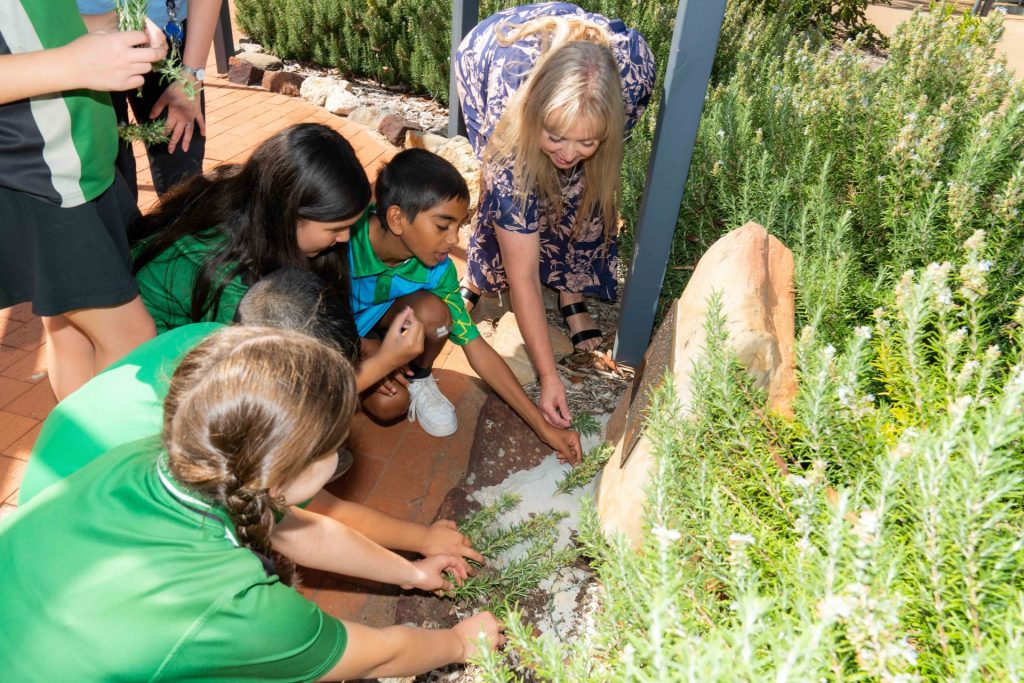
Recognition – and reflection
The Public Education Awards, run by the Department for Education, celebrate the people shaping South Australia’s public education system through equity and excellence – from teachers and leaders to whole-school teams.
Tarsha was one of 12 winners announced at a ceremony on Friday, November 7.
The other winners were:
Equity and Excellence in Education sponsored by Credit Union SA
Winner: Amata Anangu School
Empowering futures through cultural connection and collaborative learning
Innovation in Teaching and Learning
Winner: Jason McKenzie, Coordinator Teaching and Learning, English and Humanities
Christies Beach High School
Learning expeditions that connect students with real-world issues
Excellence in Learner Agency
Winner: Cory O’Connor, Agriculture and Science Teacher
Penola High School
Hands-on agriculture, future-ready learners
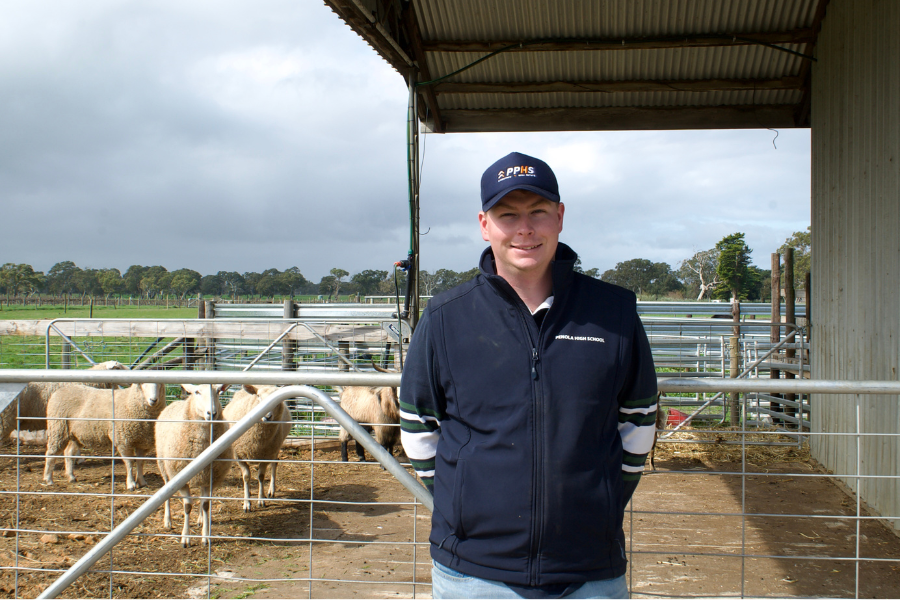
Inclusive Practices in Education
Winner: The Inclusion House Cup
Berri Regional Secondary College
Redefining belonging, celebrating diversity, building unity
Excellence in Collaborative Partnerships
Winner: Together We Grow: Intergenerational Play and Learning
Barker Kindergarten, North Adelaide
Bridging generations through play and learning
Community Impact Award
Winner: Resilient Lenswood Project – a Parents in Education Grant initiative
Lenswood Primary School
Learning resilience, leading community
Aunty Josie Agius Award
Winner: Jenny Bishop, Aboriginal Education Support Worker
Millicent High School
Creating belonging through art and culture
Excellence in the Support of Early Career Teachers
Winner: Tarin Zurlino, Year 5/6 Teacher and Early Career Teacher Lead
Newbery Park Primary School, Millicent
Leading from the start: Tarin’s transformative impact on Early Career Teachers (ECTs)
Outstanding Safety Initiatives
Winner: Trauma Informed Practice in Education program
Support and Inclusion, Adelaide
Building safe, inclusive and resilient learning communities
Excellence in Collective Wellbeing
Winner: Cultural Safety, Inclusion and Anti-Racism
Parafield Gardens High School
Safe, inclusive and culturally responsive learning
Outstanding Reconciliation Initiatives
Winner: Relocation of Warriappendi Secondary School
Warriappendi Secondary School, Infrastructure and Aboriginal Education
Strengthening identity and belonging through self-determination and pride
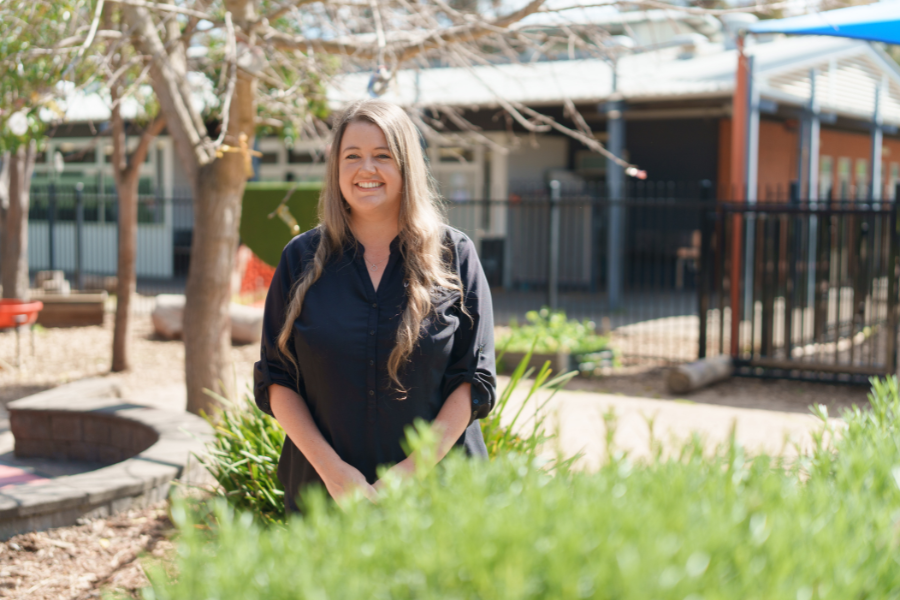
Why the early years matter so much
Tarsha’s passion for early childhood came when she least expected it. “I started in primary teaching, but once I worked with little ones, I realised that’s where you make the biggest difference,” she says.
Science backs her up: around 90 per cent of brain development happens before age five, and nearly one in four South Australian children currently starts school developmentally vulnerable.
That’s exactly what the state’s Flying Start reforms aim to change – investing in early learning, family supports and new initiatives like universal three-year-old preschool to give every child a flying start in life.
“Those early years are everything,” she says. “When we get it right early, it changes the whole trajectory for children and families.”
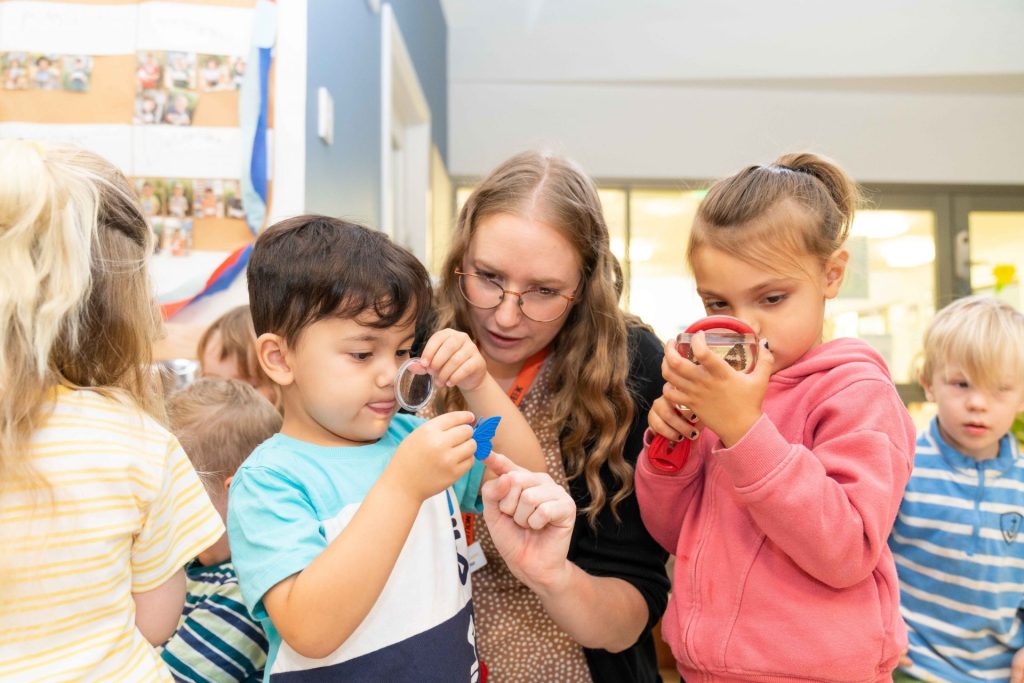
The bigger picture: South Australia’s Flying Start
Lake Windemere’s upcoming transition to an Integrated Hub in 2027 is part of the state’s $1.9 billion Flying Start reforms, the biggest investment in early childhood in South Australia’s history.
The Royal Commission into Early Childhood Education and Care found that all children benefit from two years of high-quality preschool and that vulnerable children are likely to benefit the most from more hours. The state government is offering 30 hours of preschool a week for up to 2,000 3 and 4-year-olds who need extra support by 2032. This is called Preschool Plus, a core offering at Integrated Hubs.
By 2032, 20 Integrated Hubs will open across the state – drawing on the strengths of the existing Children’s Centre network and the latest research on the best approaches for delivering integrated early years services. The Integrated Hubs will combine locally-tailored preschool, health, wellbeing and family services, and serve as pivotal models for how early education will be delivered in future.
The reforms also include:
- Universal three-year-old preschool, rolling-out from 2026 so every child can access two years of teacher-led, play-based learning
- A $118 million investment in the early childhood workforce to attract, retain and upskill vital early childhood staff
- Preschool Plus, offering up to 30 hours per week for children who will benefit most
- And the QualifySA in Early Childhood program, which provides up to $25,000 in financial support for those training to become early childhood teachers or educators.
Together, they aim to give every child in SA a flying start, grow a proud, skilled and sustainable workforce and support local services that are deeply connected to the families they serve.
You can read about all of the Public Education Awards finalists here.


